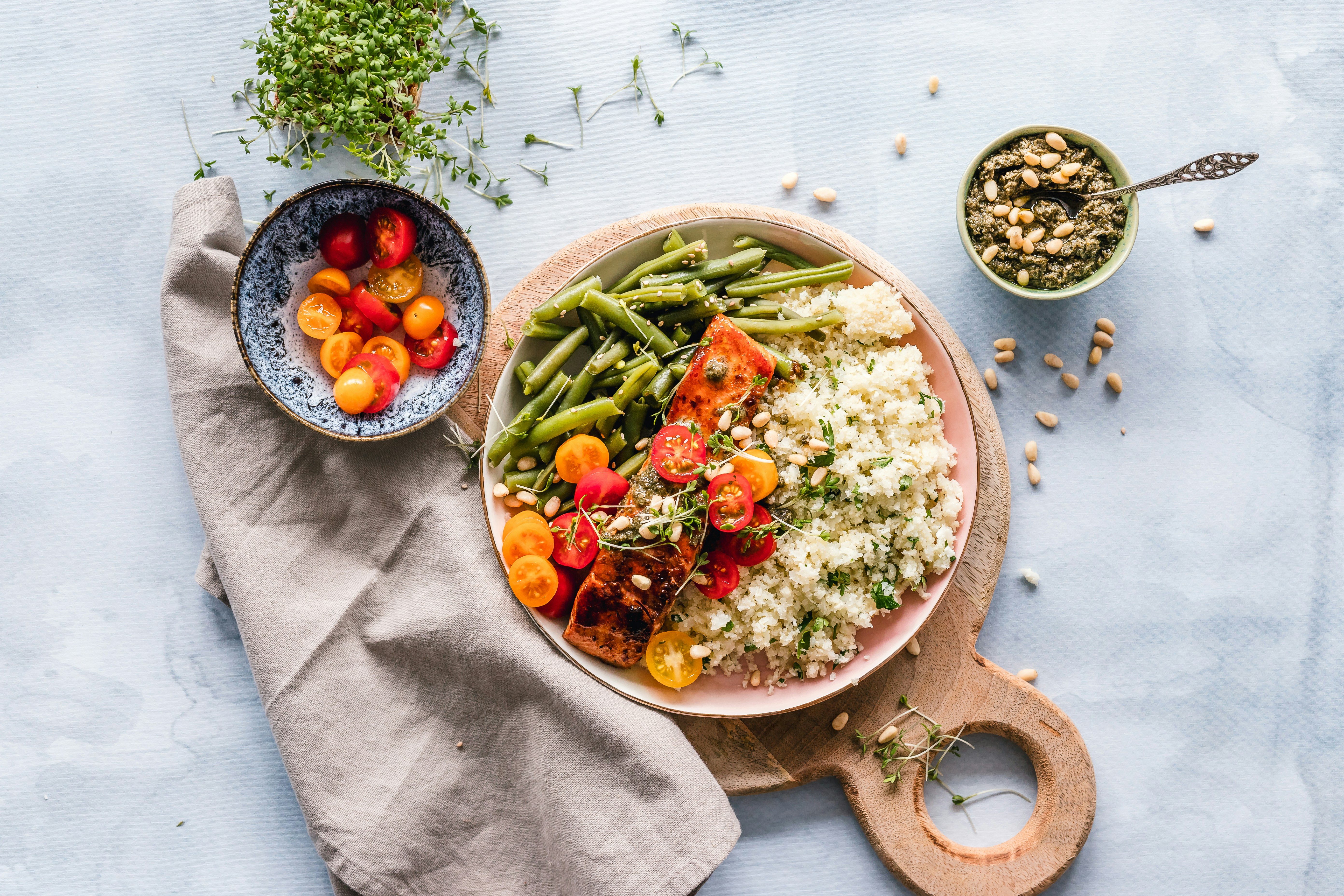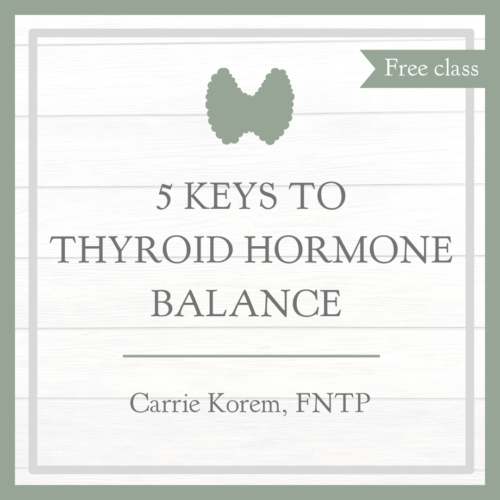What diet is best for hyperthyroid? There are certain foods that can help support the body if you have hyperthyroid and some foods that are best avoided. As someone who has struggled with hyperthyroidism in the past and has worked with many clients who have hyperthyroidism, I’ve seen first hand what can help.
What is hyperthyroidism (over active thyroid)
Hyperthyroidism happens when the thyroid gland makes too much thyroid hormone. This condition is also known as overactive thyroid. Hyperthyroidism speeds up the body’s metabolism.
Hyperthyroidism is most often diagnosed when TSH (thyroid stimulating hormone) levels are low and free T4 and/or free T3 levels are high.
It is common for someone to be diagnosed hyperthyroid by only testing TSH (a pituitary hormone). So, it is always recommended to get a full thyroid panel so you can know if your thyroid hormones such as fT4 and fT3 are also elevated.
Here’s a list of some of the most common symptoms:
- Nervousness
- Irritability
- Increased sweating
- Heart racing
- Hand tremors
- Anxiety
- Difficulty sleeping
- Thinning of your skin
- Fine brittle hair
- Increased sensitivity to heat
- Weakness in your muscles—especially in the upper arms and thighs.
- More frequent bowel movements
- Weight loss
- Excessive appetite
- Irregular Menstrual cycles
- Lots of energy (often too much)
- Lack of energy (as the body breaks down)
- Bulging Eyes
- Goiter
- Graves Disease
Can diet help people with Hyperthyroidism?
Absolutely! The best way I can describe it is that the foods we eat, give the cells of our body the tools that it needs to function.
The cells of our body make up the tissues. The tissues make up the organs. And, the organs make up the systems of the entire body.
If you are providing your cells with the nutrients they need to function well, then the body will be well. So yes, your diet can make a massive impact on the health of your body and especially when it comes to Hyperthyroid.
Do I Need to be on a Restrictive Diet to Heal?
So many people believe that you need to go on a super restrictive diet when you have hyperthyroidism. But, the issue with this is that when you remove healthy foods such as raw or cultured dairy, pastured eggs, animal foods, carbs, beans, etc. the severe restriction is just too stressful on the body.
I cannot tell you how many clients I’ve worked with who were eating AIP, carnivore, keto, doing intermittent fasting, etc. and once we went back to adding in more foods and eating regular meals their symptoms such as anxiety, stubborn weight, insomnia, blood sugar imbalance, etc. went away.
It’s so important to remember that we need to nourish to heal, not restrict.
Also, the body is in overdrive when it is in a hyperthyroid state, so it’s going to need additional calories and nutrients. Making sure you eat plenty of nutrient-dense foods is imperative.

Foods to eat if you have hyperthyroid:
1. Lots of Vegetables – While there’s no limit to your vegetable consumption, I do recommend that most of the vegetables you consume are cooked in healthy fats such as butter, ghee or coconut oil. Since most people with thyroid disease also have digestion issues, cooking the vegetables instead of eating them raw helps make digestion easier.
If your fT4 is elevated, then one group of vegetables to eat raw is goitrogenic vegetables. Goitrogens can inhibit the uptake of iodine into the thyroid and lower thyroid hormones, so eating raw goitrogenic foods if fT4 is elevated can help lower your thyroid hormones.
Here’s a quick list of goitrogenic vegetables for you:
Bok Choy
Broccoli
Brussels sprouts
Cabbage
Cassava
Cauliflower
Collard Greens
Kale
Millet
Mustard Greens
Rapeseed (aka Canola)
Rutabagas
Spinach
Turnips
2. Pastured Butter and Animal Fats – Butter contains omega-3s, a highly absorbable form of iodine, and vitamin A, which are all crucial for proper thyroid function.
Animal fats such as ghee, lard, tallow and duck fat contain healthy cholesterol (you need cholesterol for hormone production and a healthy immune system), vitamins A, D, E and K, and omegas which are all needed for a healthy body.
I recommend eating about 2-3 teaspoons of animal fat at each meal. Cooking vegetables and meats in butter is an easy way to get this nutrient-dense fat in your diet.
If you’ve been using mostly avocado oil and olive oil, I recommend putting those on the shelf right now and really leaning into animal fats. My clients see a huge improvement in symptoms when they make this switch!
3. Pastured Meats – Meats such as beef, chicken, turkey, game, and organ meats contain vital nutrients such as Vitamin A, folate, Riboflavin, B6, B12, Magnesium, and zinc, which are all important for proper thyroid hormone balance.
4. Meat Stock – Meat stock, rather than bone broth, is a good food to be consuming during the early stages of healing the gut and balancing the thyroid.
Meat stock is especially rich in gelatin and free amino acids like proline and glycine. These amino acids, along with the gelatinous protein from the meat and connective tissue, are particularly beneficial in healing the connective tissue in the lining of the gut.
Bone broth is different from meat stock because it’s cooked longer and contains higher amounts of various amino acids. I recommend only drinking meat stock for the first 4-6 months and then switching to bone broth.
Here’s some independent testing done on both meat stock and bone broth, and you can see the results here and read more about the differences between the two. For a simple meat stock recipe, click here.
5. Organic, Pastured Eggs – Eggs contain a wealth of nutrients including selenium, omega 3’s, vitamin A, D, E and K, choline and healthy cholesterol.
I realize that most elimination diets restrict the consumption of eggs, but unless someone has a documented egg allergy, pastured eggs can often be an important part of a thyroid healing diet.
If you’ve had testing done and have an intolerance to eggs, I suggest just giving the egg yolks a try. Most people actually react to the white and not the yolk.
6. Cultured and/or Raw Dairy – Dairy is another food that has gotten a bad reputation in recent years. Of course, we always want to stay away from factory-farmed and processed dairy, but cultured and/or raw dairy can be a healthy part of a thyroid-healing diet. These foods are rich in omega-3, Vitamin A, Vitamin D, Magnesium and B Vitamins.
Here are some examples of cultured and/or raw dairy:
Kefir
Organic, whole, plain yogurt
Cultered, organic butter
Cultured sour cream (Walaby is a great brand!)
Raw milk (search here for local sources)
Raw cheese
Mascarpone
Creme Fraiche
Of course, if you have a documented allergy to dairy, then avoid it’s best to avoid it.
7. Fermented Vegetables – Just 1 tablespoon of fermented vegetables such as sauerkraut contains millions of probiotics. It’s a wonderful food to add to each meal to help build up healthy flora in the gut. You can make sauerkraut at home (it’s actually very easy!), or purchase at your local health food store. A good one to get started with is the dill pickle kraut from Farmhouse Culture. This is great food for the kids to eat as well!
8. Soaked Nuts, Seeds, Legumes, Lentils and Grains – All of these foods are good options, but they do need to be properly prepared (aka soaking, spouting, fermenting, etc.).
All grains, legumes, nuts and seeds contain anti-nutrients that require neutralization. Nuts and seeds contain enzyme inhibitors that block digestion – potentially causing negative effects on the health of the body. Grains and legumes contain phytic acid that robs the body of important minerals like magnesium, calcium, zinc, copper and iron.
Over time, when we consume these foods without properly preparing them, serious health issues like leaky gut, irritable bowel syndrome (IBS), and autoimmune problems can arise.
Soaking these foods may sound intimidating, but it’s actually very easy! It basically involves putting the food in a bowl, covering it with water, adding a neutralizer, letting it sit at room temperature, and then draining.
It takes a little forethought, but your body will certainly thank you! Here’s more info on this topic and directions on how to soak these foods.
9. Good unprocessed salt, such as Grey Celtic sea salt. When the body is hyperthyroid, it will burn through a lot of minerals, so consuming mineral-rich Celtic sea salt throughout the day is a great way to bring in additional minerals into your diet.
10. Fruit is a good option, but it’s best to eat it in moderation and always at the end of a meal. When the body is in a hyperthyroid state, there is often blood sugar imbalance, so eating fruits at the end of a meal can help keep blood sugar more stable.
If you have elevated glucose levels, then eating just berries while you work to get your blood sugar back into balance can be a great idea.
Before I list the foods to avoid, let’s remember not to get focused on this list. Educate yourself on the foods to avoid, but then focus on the foods you can eat. This will help take some of the stress out of the process!
Foods to avoid if you have hyperthyroid:
1. Processed Foods and Sugars – Processed foods and sugars create hormone imbalance, increase inflammation, and are terrible for proper gut and thyroid healing, so all processed foods should be avoided when someone has thyroid disease.
2. Unsoaked Nuts, Seeds, Legumes, and Grains – While nuts, grains, seeds, legumes and grains are healthy foods, they do contain anti-nutrients that need to be reduced so they don’t rob your body of minerals when consumed. Here’s an article I wrote on this topic with exact directions on how to properly prepare these foods.
3. Keep an eye on how much iodine you consume. If you have elevated fT4 or fT3, then you should talk to your nutritionist about the right amount of iodine-rich foods that your body needs. The body needs iodine for much more than just thyroid hormone production, but if you are make too much thyroid hormone, then eating too much iodine can possibly create further hyperthyroid issues.
In general, it’s usually ok to eat foods that contain iodine such as pastured eggs, raw cheese, butter, and some wild seafood, but you’d want to avoid eating large amounts of seaweed or other foods that contain a very high amount of iodine in them. I have a reference chart below so you can see the various amounts of iodine in different foods.
If you have Hashi’s and you’re concerned that it may cause negative symptoms, this article will clear things up for you.
Here’s a list of the amount of iodine in various foods for reference (according to the NIH):
Seaweed, nori, dried, 10g or 2 tablespoons 232 mcg
Cod, 3 ounces 158 mcg
Plain yogurt, 1 cup 116 mcg
Oysters, 3 ounces 93 mcg
Milk ~85 mcg (this various according to the season)
Egg 26 mcg
Cheese, 1 ounce 14 mcg
Liver 14 mcg
Shrimp, 3 ounces 13 mcg
Tuna, 3 ounces 7 mcg
As as you can see in this study, the amount of iodine in milk, fish, and eggs varies upon the geographical location. So, the numbers above are approximate.
Again, talk to your practitioner about the right amount of iodine for you while you’re working to reduce your fT4 or fT3.
4. Processed Fats and Oils such as margarine, vegetable oil, canola oil, corn oil, soy oil, etc. These oils and fats are highly processed and promote inflammation in the body.
A very common root cause of hyperthyroidism is toxicity in the body. Processed seed oils are not healthy for the liver, so avoiding these oils helps support your liver and over all natural detoxification in the body.
5. Non-Organic and Conventionally Grown Foods – Pesticides are known to cause thyroid hormone imbalance, so it’s best to avoid as many conventionally-raised foods as possible. If you don’t know where to start, start with the foods you eat most often and then work from there.
6. Processed Dairy – Pasteurized and homogenized dairy is actually a processed food! To make matters worse, synthetic vitamins such as A and D are added back to the milk because they are destroyed during processing. Conventional, processed dairy causes inflammation and shouldn’t be part of a healing diet.
7. Alcohol – Unfortunately, alcohol and caffeine are liquid stress for the adrenals, which have a huge impact on the thyroid and immune system, so it’s best to avoid them as much as possible.
8. Caffeine – As with alcohol, caffeine is also liquid stress for the adrenal, which has a negative effect on thyroid health. If you drink a lot of caffeine right now, I recommend taking steps to slowly reduce your consumption. Here are some easy steps to take to reduce your coffee intake. I also have a coffee substitute that’s pretty darn good!
9. What about about gluten?
If you have any gut or digestion issues or if you have thyroid antibodies (Hashimoto’s or Graves’), then it’s best to avoid gluten while you work to heal the root causes of your health issues. When you have healed your gut and antibodies are back to optimal (yes, they can go into remission!), then oftentimes properly prepared grains (such as wheat) can be added back.
If you don’t have any of the issues listed above, then foods like fermented sourdough, soaked or sprouted kamut, einkorn, rye, etc. can often be included in a healing diet.
It’s best to ask your nutritionist what’s best for you so that you don’t avoid a food that isn’t necessary to avoid. Remember, it’s all about nourishing to heal, so keeping as many foods in your diet as possible is incredibly helpful!
10. Soy – Soy isoflavones inhibit the enzyme thyroid peroxidase (TPO) that plays a key role in thyroid hormone synthesis, and they also interfere with thyroid hormone production. Soy intake can interfere with thyroid medication absorption, so it’s best to avoid it.
If you’re looking for recipe inspiration, I’ve got hundreds of them for you right here!
If you’d like to learn some first steps you can take to help support your thyroid, check out my class, “5 Keys to Thyroid Hormone Balance”. It’s just 45 minutes and I promise you’ll learn something new!
Sources:
nhs.uk/…thyroid-hyperthyroidism/diagnosis
https://www.sciencedirect.com/topics/agricultural-and-biological-sciences/goitrogen



